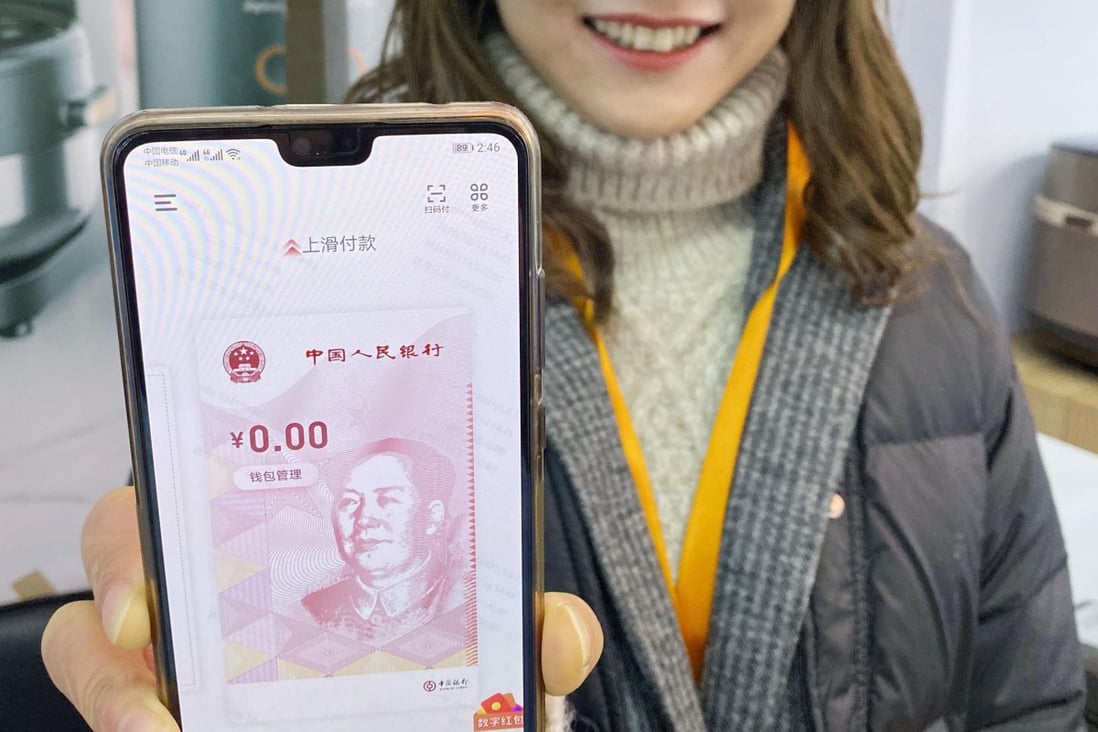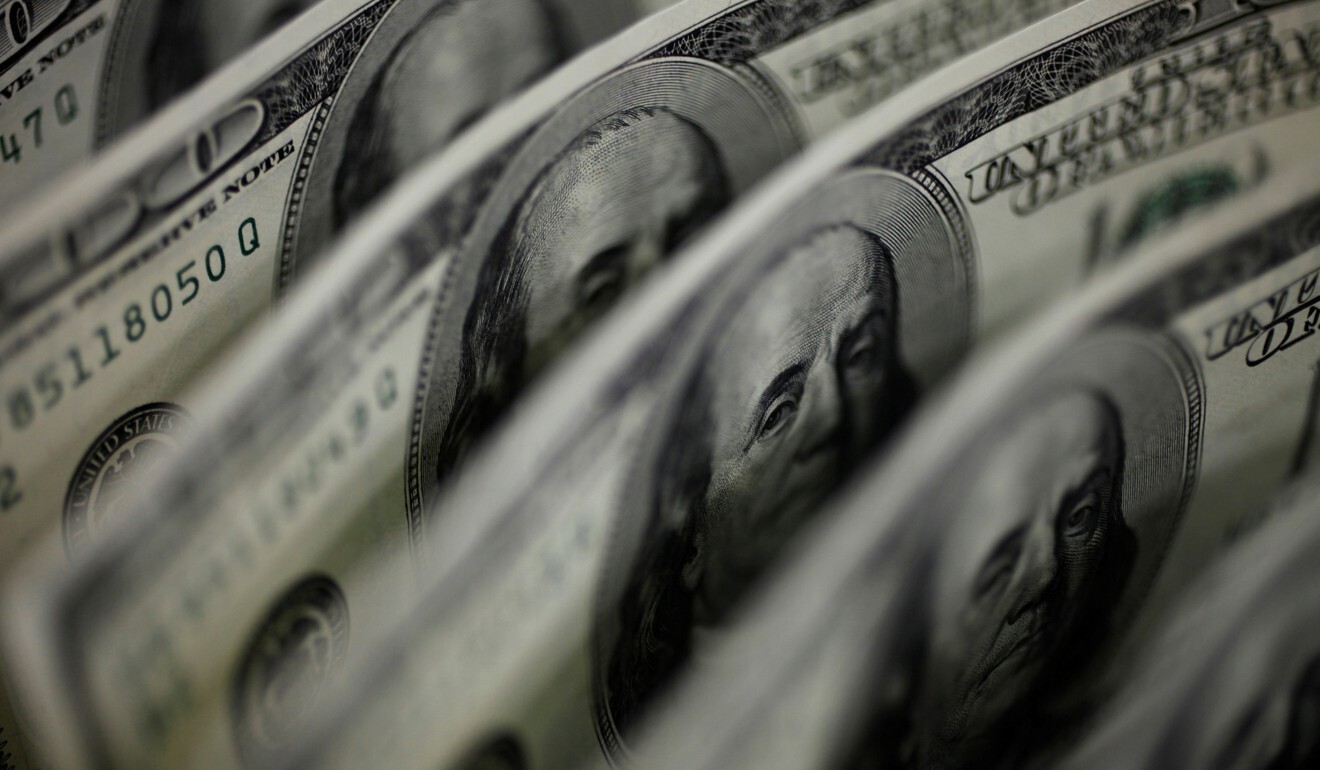Macroscope by Andrew Leung
How China’s digital currency will thwart US dollar trap and help the world
The digital renminbi is a sovereign currency fully backed by the state, does not require a bank account and has full oversight by Chinese banking authoritiesDeveloping countries will embrace the convenience of China’s digital payment systems, which have great poverty-relief potential for the world’s unbanked poor

Published: 10:00pm, 28 Dec, 2020Why you can trust SCMP


A woman in Suzhou, China, shows a smartphone app that allows its user to buy things with the digital yuan. This is part of an ongoing trial of the new currency. Photo: Kyodo
The US dollar displaced the British pound as the world’s leading reserve currency at the beginning of the last century. Since the Bretton Woods Agreement in 1944 linked world currencies to the dollar, it has reigned supreme.
As China opened up and became integrated with the world trading and financial systems, it has been caught in a “dollar trap”, having to convert excess national savings into secure, internationally-convertible US treasuries.
Over the years, the US has enjoyed the dollar’s exorbitant privilege of almost unlimited money-printing, or “quantitative easing” in central bank parlance. As former US president Richard Nixon’s Treasury secretary John Connally famously said, “The dollar is our currency, but it’s your problem.”
Arvind Subramanian, senior fellow at the Peterson Institute for International Economics, pointed out in 2011 that the world was living in the shadow of China’s economic dominance. More national currencies were moving in tandem with the renminbi instead of the dollar. Nevertheless, the dollar is being increasingly weaponised to impose economic sanctions on China.

The US dollar has reigned supreme since the Bretton Woods Agreement in 1944 linked world currencies to the dollar. Photo illustration: Reuters
However, owing to America’s dwindling domestic savings and a gaping current account deficit, Stephen Roach has warned that the dollar’s “exorbitant privilege” is about to end.Now China is pursuing a national digital currency. Unlike a speculative cryptocurrency, the digital renminbi is China’s sovereign currency fully backed by the state. It’s a natural development as China has become by far the world leader in digital payment systems.
Driven by latest blockchain technology, China’s digital currency does not require a bank account. This has huge poverty-relief potential for the unbanked poor across the globe.DAILYOpinion NewsletterBy submitting, you consent to receiving marketing emails from SCMP. If you don’t want these, tick hereBy registering, you agree to our T&C and Privacy Policy
As Chinese banking authorities have full control, the digital currency will help combat illicit financial transactions. The financial data will facilitate the formulation and execution of monetary policies.As its transactions are instant and transnational, the digital currency would be attractive for international trade settlements with China, including projects in the digital Silk Road of the Belt and Road Initiative.
The latter faces increasing headwinds from host countries, such as debt unsustainability, ecological neglect, non-transparency and corruption. China’s authorities are learning fast, though. Working more closely with international organisations such as the World Bank and broader stakeholders in host countries and elsewhere, China is making significant headway with belt and road projects.
What is more, the digital currency does not depend on the US-controlled Society for Worldwide Interbank Financial Telecommunication (Swift) banking system. It is thus immune to dollar-based US sanctions.https://open.spotify.com/embed-podcast/episode/7pHWltfGBCSl66mcW7F9VtAccording to a July 2019 McKinsey report, China has become more self-sufficient while the rest of the world, particularly Asia and resource-rich countries across the globe, have grown more dependent on China for parts, components, materials, trade and investment. This supply-chain connectivity is not easy to shift, efforts at decoupling notwithstanding.While the United States and Western allies are not about to warm to China‘s digital currency any time soon, more countries in Asia, Africa and Latin America are likely to embrace the convenience and opportunities of China’s digital payment systems, made even easier and safer by its sovereign digital currency. This trend is likely to accelerate with the commencement of the Regional Comprehensive Economic Partnership, comprising a third of the world’s population and a third of world GDP.
With the Covid-19 pandemic under better control in China compared with other nations, China’s economy is surging ahead, including in exports, investment and domestic consumption. As China’s “Singles’ Day” e-shopping bonanza successes show, digital payments will continue to transform retail sectors in China and worldwide.
Additionally, China’s outbound tourism has occupied the world’s top spot since 2013. The digital sovereign currency is therefore well-timed.
In October, the dollar lost its top position as the world’s most used payment currency, falling behind the euro for the first time since 2013, thanks to the erosion of the dollar’s perceived value, emergence of more attractive euro and renminbi-denominated assets and aversion to US sanctions. With worsening US geopolitics, China is likely to park more of its savings in other assets, including its own bonds and some of the more viable belt and road projects.
Thanks to their vastly different performances during the pandemic, China’s economy is expected to overtake the United States’ five years earlier, by 2028, according to Britain’s Centre for Economics and Business Research.
All these developments will by no means dethrone the dollar all at once. No other sovereign currency, let alone the renminbi, can remotely compare with its global financial width and depth. Even falling by 10 per cent during the past two decades, the dollar still accounts for 62 per cent of global currency reserves.
However, China’s digital sovereign currency is now poised to mitigate the dollar trap, accelerate internationalisation of the renminbi and offer an escape route from dollar-based sanctions.Andrew K.P. Leung is an independent China strategist. andrewkpleung@gmail.com
Andrew Leung has had decades of experience as a senior Hong Kong government official in a variety of fields including finance, industry, social welfare and overseas representation. Since his retirement in 2005, he has built up a reputation as an international and independent China strategist. He features regularly in international TV channels and conferences.
https://37fbc63e42f7601f0ac69e1a9acb463b.safeframe.googlesyndication.com/safeframe/1-0-37/html/container.htmlRead moreChina’s digital yuan no threat to global monetary systems, ex-PBOC chief saysRead moreWhy the Fed may be forced to hit the brakes on US dollar slideRead moreForget decoupling. China’s economy is wedded to globalisationRead moreThree lessons from China’s Singles’ Day for a pandemic-hit retail world